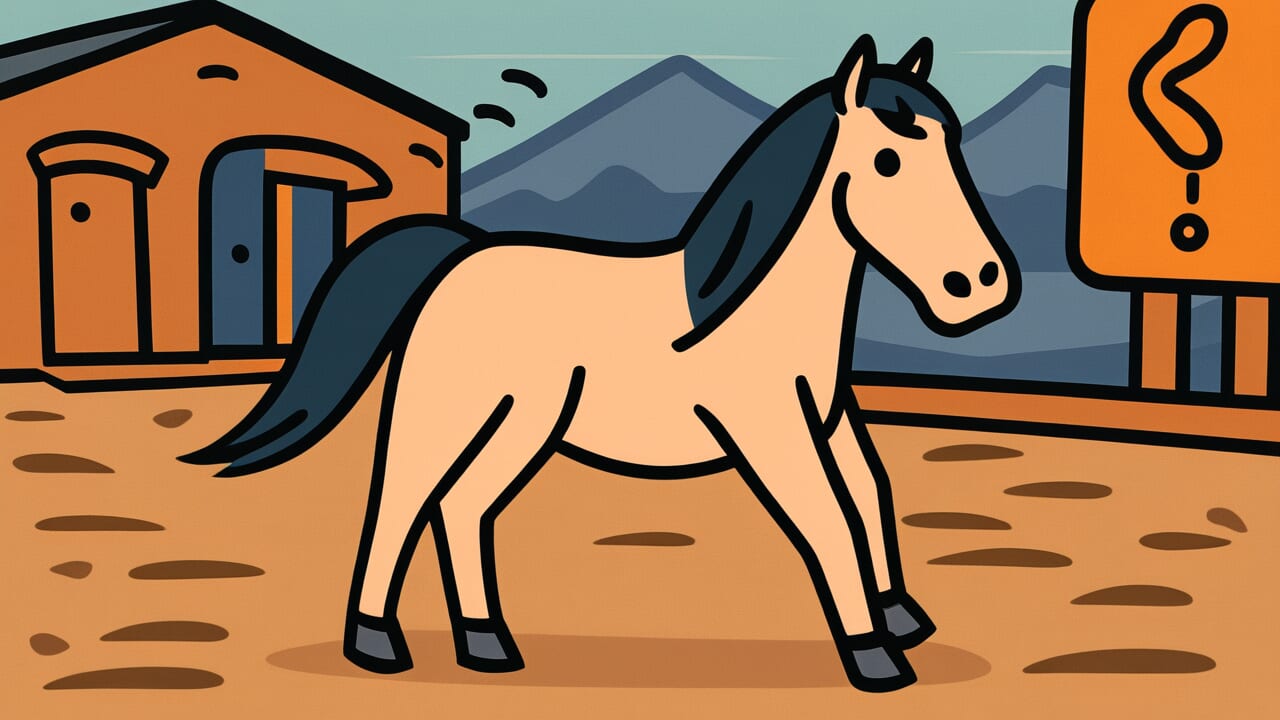How to Read “A thin horse’s threatening neigh”
Yaseuma no koe odoshi
Meaning of “A thin horse’s threatening neigh”
“A thin horse’s threatening neigh” is a proverb that describes how people with little substance tend to boast the loudest. It comes from observing that thin horses neigh frequently.
The saying points out that people without real ability or achievements often show off with loud voices and intimidating attitudes.
You use this proverb when describing someone who talks big but lacks real ability. It fits people who make bold claims in meetings but produce no concrete results.
It also applies to those who wave around their titles and positions but lack actual work skills.
People with real ability don’t need to shout about themselves. Their work and achievements naturally earn recognition.
On the other hand, some people try to hide their lack of confidence or ability with loud voices and intimidating behavior. This proverb sharply captures this human psychology.
Origin and Etymology
No clear written records explain the origin of this proverb. However, we can make interesting observations from how the phrase is constructed.
First, let’s look at “thin horse.” Horses were crucial workers in ancient Japan for farming, transportation, and warfare.
Healthy, strong horses had high value. Thin horses couldn’t work properly and symbolized lack of ability.
Next comes “threatening neigh,” which means intimidating others with your voice or speaking loudly and arrogantly.
What’s interesting is that this expression came from actually observing that thin horses neigh frequently. Horses with declining strength may have tended to make more noise.
When this observation overlapped with human social truth, the proverb was born. People without ability try to compensate by making loud claims.
Our ancestors showed sharp insight by understanding human nature through animal behavior.
This proverb is a crystallization of wisdom rooted in daily life. It could only emerge from an agricultural society where people lived closely with horses.
Usage Examples
- That new employee has no track record but speaks so arrogantly in meetings. It’s truly a thin horse’s threatening neigh.
- People who brag flashily about success on social media often lack substance. That’s a thin horse’s threatening neigh.
Universal Wisdom
“A thin horse’s threatening neigh” has been passed down because it brilliantly captures fundamental human anxiety and the psychology of trying to hide it.
Everyone carries the desire to hide their weaknesses and shortcomings from others. When ability falls short, that anxiety grows larger.
Strangely, the bigger the anxiety, the more people try to appear bigger. They speak loudly, take intimidating attitudes, and try to show off their presence.
This might be a form of self-defense.
Meanwhile, truly capable people remain quiet. They don’t need to prove their ability because results speak for themselves.
This contrast is the heart of this proverb.
Our ancestors noticed an important truth. Loudness and ability are often inversely related.
They also recognized the timeless human psychology behind it: weakness and bluffing.
This proverb teaches us the importance of seeing through superficial bravado to the essence beneath.
At the same time, it serves as a mirror prompting us to reflect on whether we ourselves are putting on airs.
When AI Hears This
In the animal world, truly strong individuals don’t pay the cost of intimidation. This is called costly signaling theory.
For example, healthy male deer have magnificent antlers. But maintaining antlers requires about 20 percent of their body weight in energy.
The antlers themselves prove “I can afford to waste this much cost.”
A thin horse threatening with its voice is exactly the reverse of this theory. Individuals without physical strength can’t engage in high-cost physical combat.
So they have no choice but to rely on low-cost vocal intimidation. Ornithology research shows that individuals using calls frequently in territorial disputes tend to have smaller actual body sizes.
In other words, the observation that frequently barking dogs are actually weak is biologically correct.
What’s interesting is that this principle also functions in human society. Truly capable experts don’t loudly assert their authority.
That’s because they’ve already sent high-cost signals through their achievements. Conversely, people with little ability assert themselves through titles and loud voices.
This represents the biological constraint of having only low-cost vocal signals as a means of communication.
Lessons for Today
This proverb teaches modern people the value of “quiet confidence.” In an era where everyone can broadcast on social media, the temptation to stand out through loudness is strong.
But what truly matters is steadily building your ability and becoming someone who can speak through results.
Next, this proverb teaches the importance of “discernment.” At work or online, you might be swayed by loud people.
But what lies behind their words? Do they have actual achievements? By observing calmly, you can distinguish the real from the fake.
Most importantly, this proverb prompts self-questioning. Are you putting on airs right now? Are you trying to appear bigger than necessary to hide your anxiety?
If so, that’s a chance for growth. Quietly and steadily build your real ability.
If you choose that path, eventually your value will naturally communicate itself without needing to raise your voice.



Comments